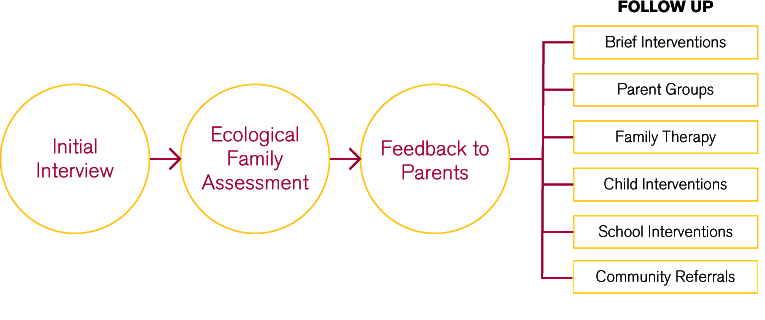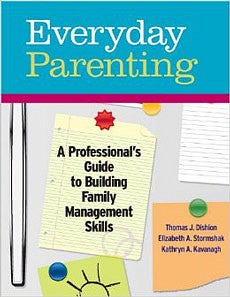The Family Check-Up addresses the specific needs and strengths of each family. Providers use motivational interviewing to help parents identify things they can change to improve their relationships with their children and their children’s behaviors. The first step in the process is the initial interview. The second step is a comprehensive, ecological family assessment to identify a family's needs and strengths. The final step is the feedback session when the provider and parents meet to discuss the family’s needs and goals for follow-up services.

Initial Interview
The purpose of the initial interview is to build rapport and explore the parents’ strengths and challenges related to parenting and the family context, discuss how parenting and family management practices influence their child’s behaviors, and learn about parents’ motivation for change. The provider uses motivational interviewing – exploring the advantages and disadvantages of the parents’ current practice - and reflective listening to motivate parent engagement in the change process. During this initial interview, the provider first describes the Family Check-Up, checking in with the parents to make sure their questions are answered, and that they feel comfortable with the process. Next, the provider asks open-ended questions to learn about strengths of the family and individual family members. The provider also uses open-ended questions to learn what challenges the family has been experiencing and about resources and strategies the family has been using to manage these challenges. Throughout the interview, the provider offers encouragement, empathy, and support and instills hope that the parents can create the change they desire. By the end of the interview, the goal is that the parents feel understood, and that the provider has clarified parents' goals and their motivation to engage in services.
Assessment
The Family Check-Up assessment is strengths-based and ecological, integrating information about child behavior, parenting skills, family dynamics, and life stressors and is used to inform follow-up intervention services. The Family Check-Up is multi-method and spans various contexts of development, including home and school. This assessment provides a wealth of information about child behavior, parenting skills, family dynamics, and life stressors that informs a menu of recommended intervention services tailored to the family’s needs. The assessment includes empirically validated parent and youth questionnaires, teacher ratings of child behavior at school, and videotaped observations of family interactions. The observational assessment of family interactions is critical for understanding the relationships among family members and the family’s strengths and challenges. Contextual stressors that affect healthy family management, such as parent depression and marital conflict, are also measured. Assessment results are represented on the FCU Feedback Form to highlight family strengths and challenges in three main areas – family context, family management and relationships, and youth adjustment, which are factors predictive of positive child outcomes.
Feedback
The last step of the Family Check-Up is the feedback session, which can take place in any location that is convenient and comfortable for the family and provider. During the Feedback, information from the initial interview and the assessment is integrated and presented on a FCU Feedback Form, representing the family’s strengths and challenge areas. The provider uses motivational interviewing strategies as key process skills to present feedback to the parents. Based on the Feedback, a menu of potential follow-up intervention services is tailored to the family’s needs and discussed with the parents. Examples of intervention service options include monthly follow-up support, individualized parent training or family management therapy, school consultations, and community referrals. The parent and provider collaboratively discuss and decide which follow-up intervention services are optimal for the parent and family.
Follow-Up
Follow-up services may include Everyday Parenting©, which is a parent management training program, and other clinical and case management supports. In some situations, services to address parent stress, depression and anxiety, substance use, limited social support, or challenges with co-parenting may be beneficial. Parent stress, depression, anxiety, substance use, financial insecurity, and other contextual risks can undermine parent and family management. In these situations, follow-up work helps the parent actively address these areas, while maintaining a focus on helping parents improve their parenting skills and family relationship processes. The Family Check-Up provider may deliver the needed parent support services or connect the parent to a community referral for the services. Follow-up work with the family should balance helping the family address contextual risks with building skills to improve parenting and family relationship processes. Follow-up services may also include interventions that offer parents support around their child’s school success. For example, home–school behavior plans can help parents track the child’s behaviors at school and offer incentives to reward positive behaviors in school. Everyday Parenting can help parents to structure school-related routines (e.g., homework schedule).
Everyday Parenting is a parent-training program that builds skills in three parenting domains: positive behavior support, limit-setting, and family relationship building. Proactive parental monitoring of the child’s behavior, feelings, and experiences and proactive parenting are common features across all three domains and form the basis of mindful parenting, which emphasizes attention to the everyday details of parenting, skillfully and with compassion. Everyday Parenting is modularized so parents can participate only in the sessions that target the one domain that they most want to improve.
Everyday Parenting: A Professional’s Guide to Building Family Management Skills, by Thomas J. Dishion, Elizabeth A. Stormshak, and Kate Kavanagh (© Research Press, 2012)
Family Check-Up® Impact





